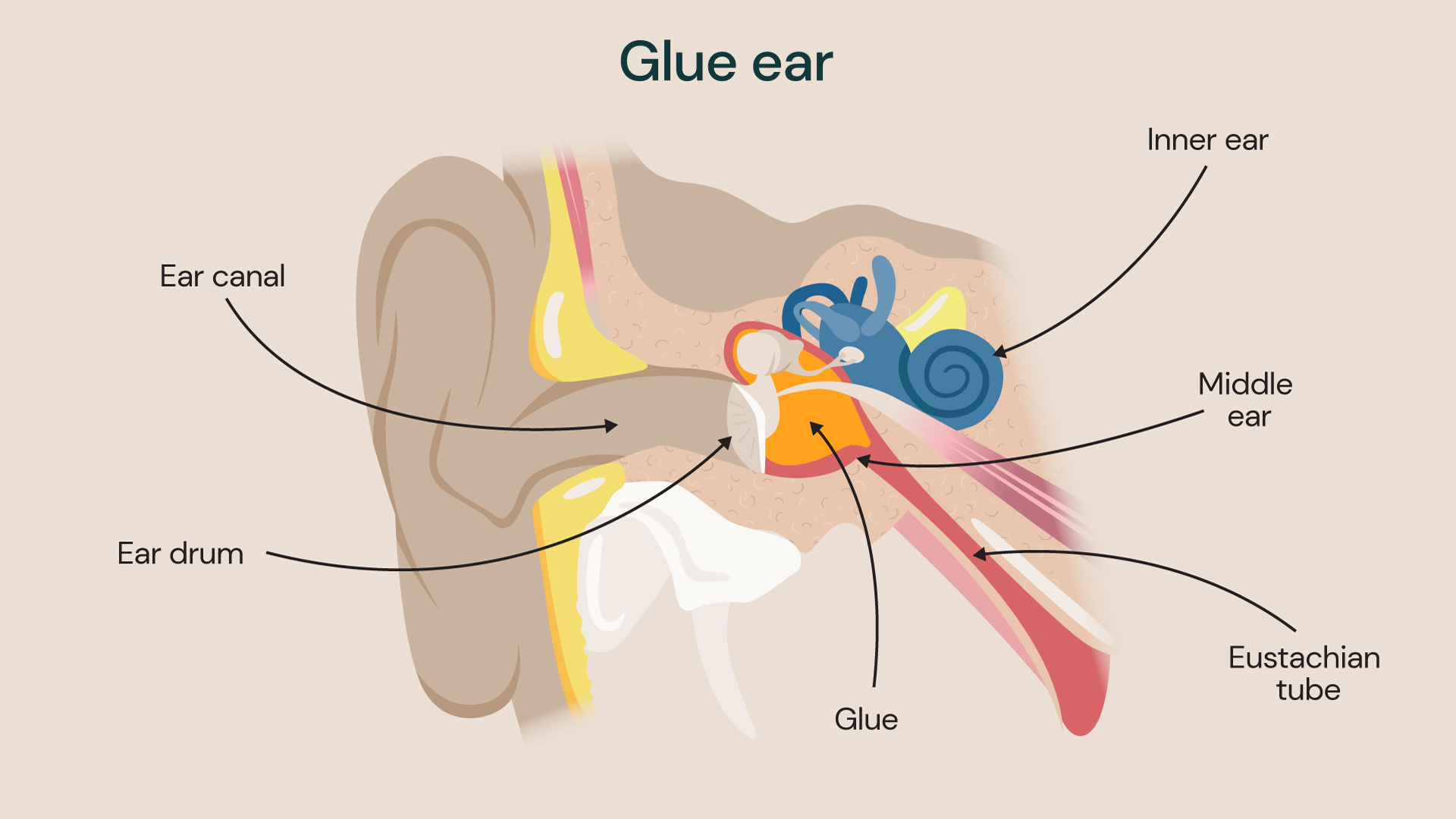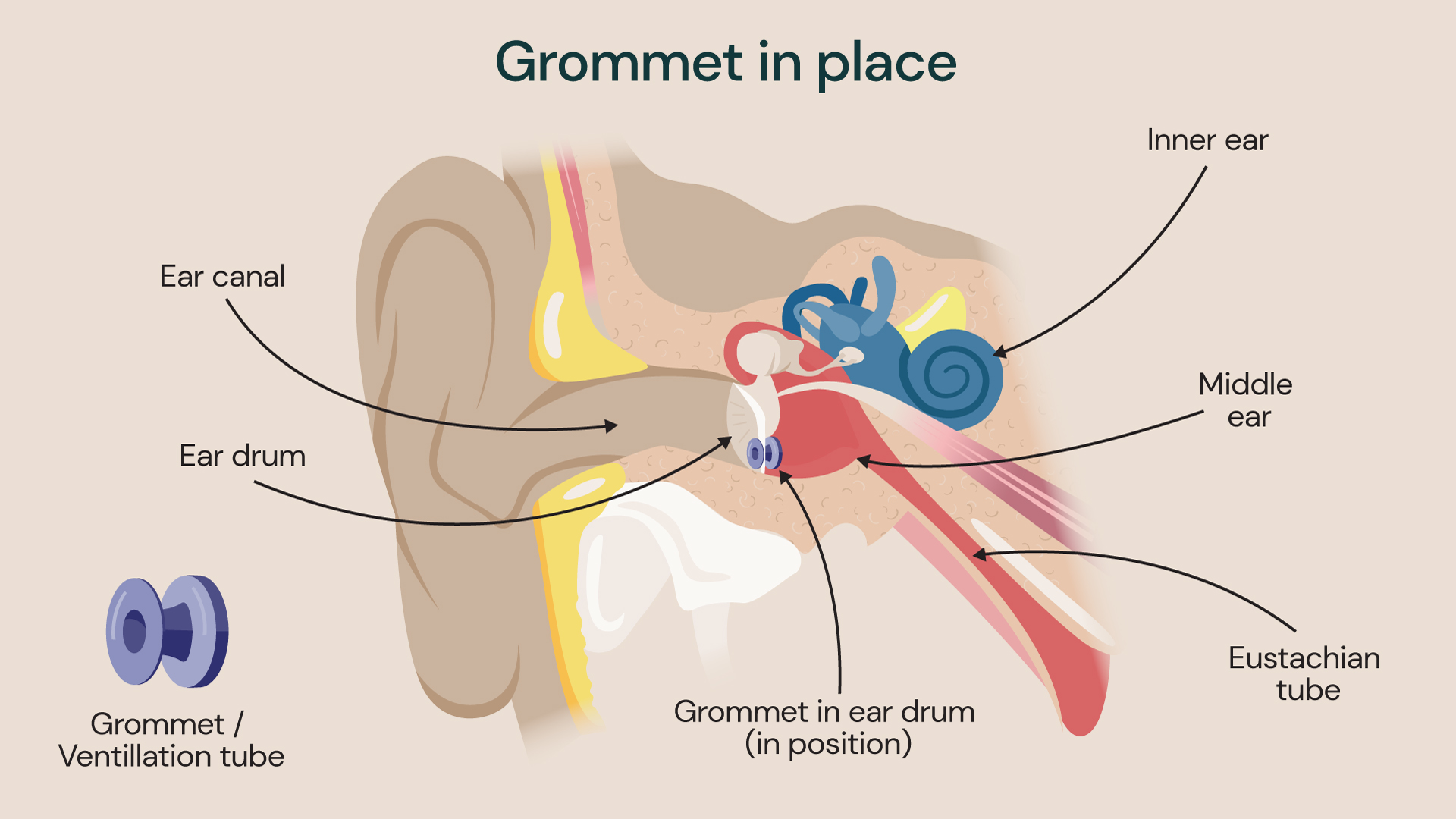Ear infections are common in children and are generally treatable. However, they can sometimes lead to further complications such as glue ear.
At Guy’s and St Thomas’ Specialist Care, your child’s health is paramount. We offer timely, accurate diagnoses and effective treatments to ensure their needs are met.
What is glue ear?
Glue ear is an ear condition that usually affects children, with around 4 in 5 children experiencing it before they reach four years old. While it can also be recurrent, most children grow out of it over time.
Glue ear affects the middle section of the ear – an air-filled cavity that transmits sound waves to your inner ear and is important for hearing.
It occurs when the middle part of the ear canal becomes full of thick and viscous fluid (hence the term ‘glue’) behind the eardrum, leading to various symptoms including ear pain, balance problems and temporary hearing loss.
Sometimes, the Eustachian tube (the tube that connects the middle ear to the back of the nose) loses the ability to drain fluid out of the ear, causing a build-up to occur and glue ear to develop.
If your child is experiencing hearing loss or symptoms of glue ear, get in touch with our dedicated children’s ENT team at Evelina London Children’s Hospital.

Glue ear occurs due to the build up of thick fluid in the middle ear.
Causes of glue ear in children
Glue ear is not caused by a build-up of wax or water in the ear. It is also not an infection but, it can be caused by an infection in the middle ear.
Some of the other potential causes include allergies and passive smoking (inhaling smoke unintentionally).
If your child has a sibling who has had glue ear previously, this could also increase their risk of developing it (the condition can run in families).
Symptoms of glue ear in children
The most common symptom of glue ear in children is hearing loss. This can be a tricky symptom to spot, especially if your child does not tell you they are struggling to hear or are too young to tell you.
However, there are some signs to look out for. If your child is experiencing hearing loss, they may:
- have difficulty understanding speech from a distance (such as not being able to hear you from another room if you call them)
- speak quietly or loudly
- have a delay in their speech development
- unexplainably become irritable due to needing to concentrate on hearing
- tuning out of conversations
- only participating in face-to-face conversations at a close distance
- struggling in social situations
There are some less common symptoms of glue ear you can look out for too. These include:
- discharge from their ear
- sleeping problems
- balance problems or clumsiness
- tinnitus
- mild ear pain
- repeat ear infections
When to take your child to see a doctor for glue ear
If you suspect your child is experiencing hearing problems, book an appointment with one of our specialists today. Glue ear is the most common cause of hearing loss in children, but they will need to rule out other conditions too.
Diagnosing glue ear in children
Diagnosing glue ear in children is simple and can be done by your GP. A small torch with a light and magnifying glass on the end will be gently placed into your child’s ear so the doctor can check for fluid build-up.
If your child has glue ear for longer than three months, they will usually be referred to a specialist. Our ear, nose and throat (ENT) specialists will determine how severe their hearing loss is and identify the underlying cause.
Glue ear treatments
Glue ear does not always require treatment and the first line of action is usually to see if it gets better on its own within three months. Your child will be monitored during this period to make sure their symptoms are improving.
If glue ear does not clear on its own, there are different treatment options available. It can be treated with repeated draining of fluid and addressing the underlying cause.
There is not one medicine that cures glue ear. If glue ear does not clear on its own, there are different treatment options available.
Grommets for glue ear
Grommets are tiny tubes that drain away fluid and keep the eardrum open. These are inserted during a surgical procedure under general anaesthetic, where a tiny hole is made in the eardrum and the grommet is placed inside.
Grommet surgery is straightforward and has very low risks associated with it. There is a low chance of infection, and around 1% of children can have a small hole in the eardrum after the grommet falls out.
After surgery, your child should:
- avoid going underwater or being submerged, including swimming for one week
- undergo a hearing test to see if the grommets have improved their hearing
Grommets are temporary and will naturally fall out after around nine to twelve months as your child’s glue ear improves. The hole in the eardrum will also heal itself once the grommets fall out.
Glue ear can return after the grommets fall out. If your child develops glue ear again, grommets can be reinserted for further drainage support.

Treatment of glue ear with grommets
Autoinflation
Autoinflation is a technique used to drain fluid from the ear. It is carried out by either:
- a medical balloon being inflated in one nostril at a time (Otovent balloon)
- repeated puffing out the cheeks with both nostrils pinched, as if on the aeroplane
Autoinflation is a treatment that needs to be carried out multiple times a day, so it’s not often recommended for children under three years old.
Antibiotics can be prescribed if your child’s glue ear is caused by recurrent ear infection.
Adenoidectomy
In some cases, an adenoidectomy is recommended. This is a routine, surgical procedure where the glands at the back of the nose (adenoids) are removed.
The adenoids begin to shrink and disappear as the child grows. However, adenoids can become infected and cause recurrent infections that can lead to glue ear. Therefore, removing them can be an effective treatment.
If your child’s hearing loss is severe or their glue ear is not responding to treatment, hearing aids may also be recommended. However, any hearing loss from glue ear is usually temporary.
Book an appointment today
We can provide you and your child with the care you need, helping you feel safe in the knowledge that you are being supported by a leading expert within child healthcare.
Locations
Our specialists provide treatment for glue ear at the following locations:
Discover our children's ENT experts
Our team of ENT experts includes consultant surgeons, specialist nurses, speech therapists and other professionals.
